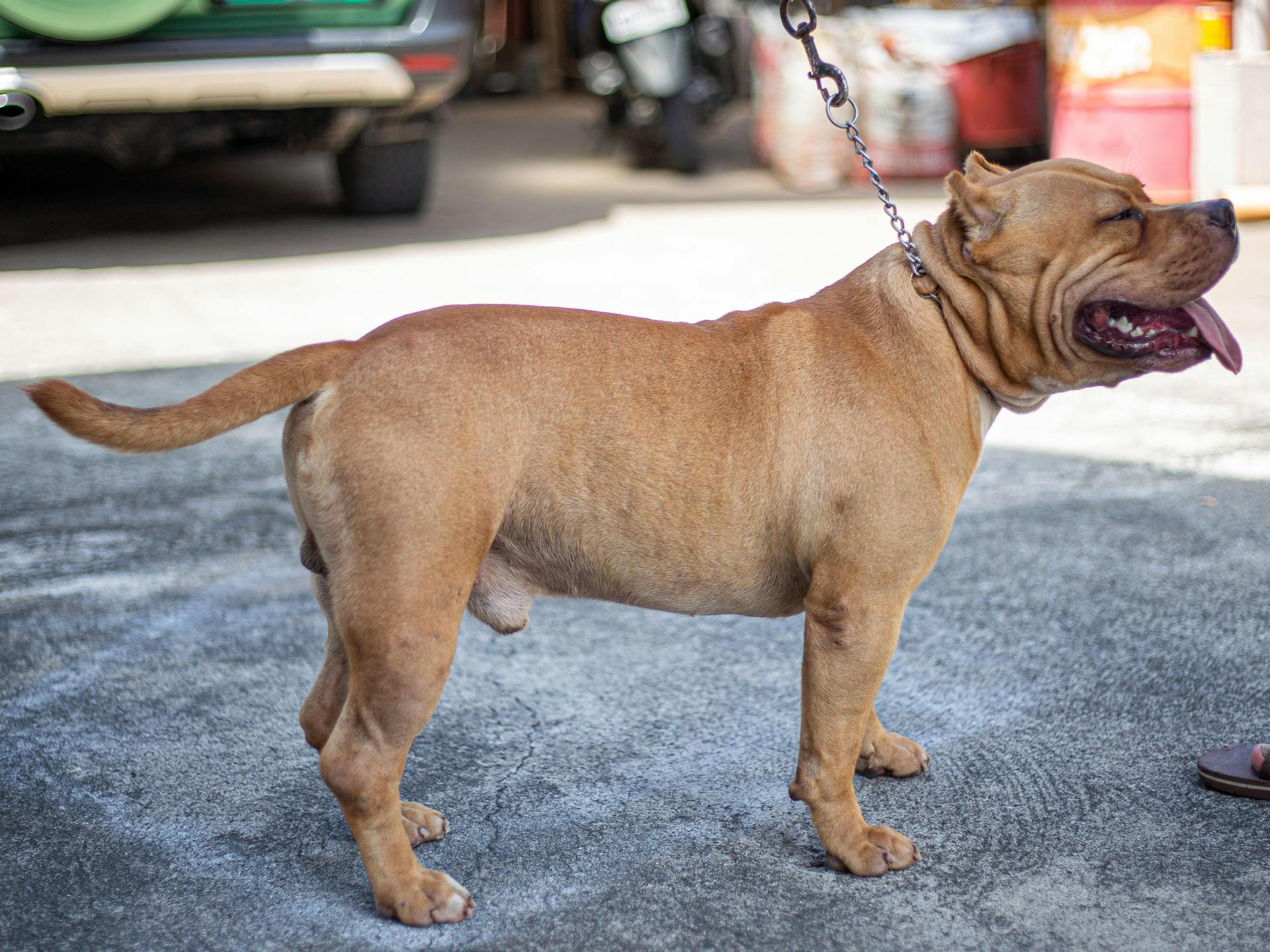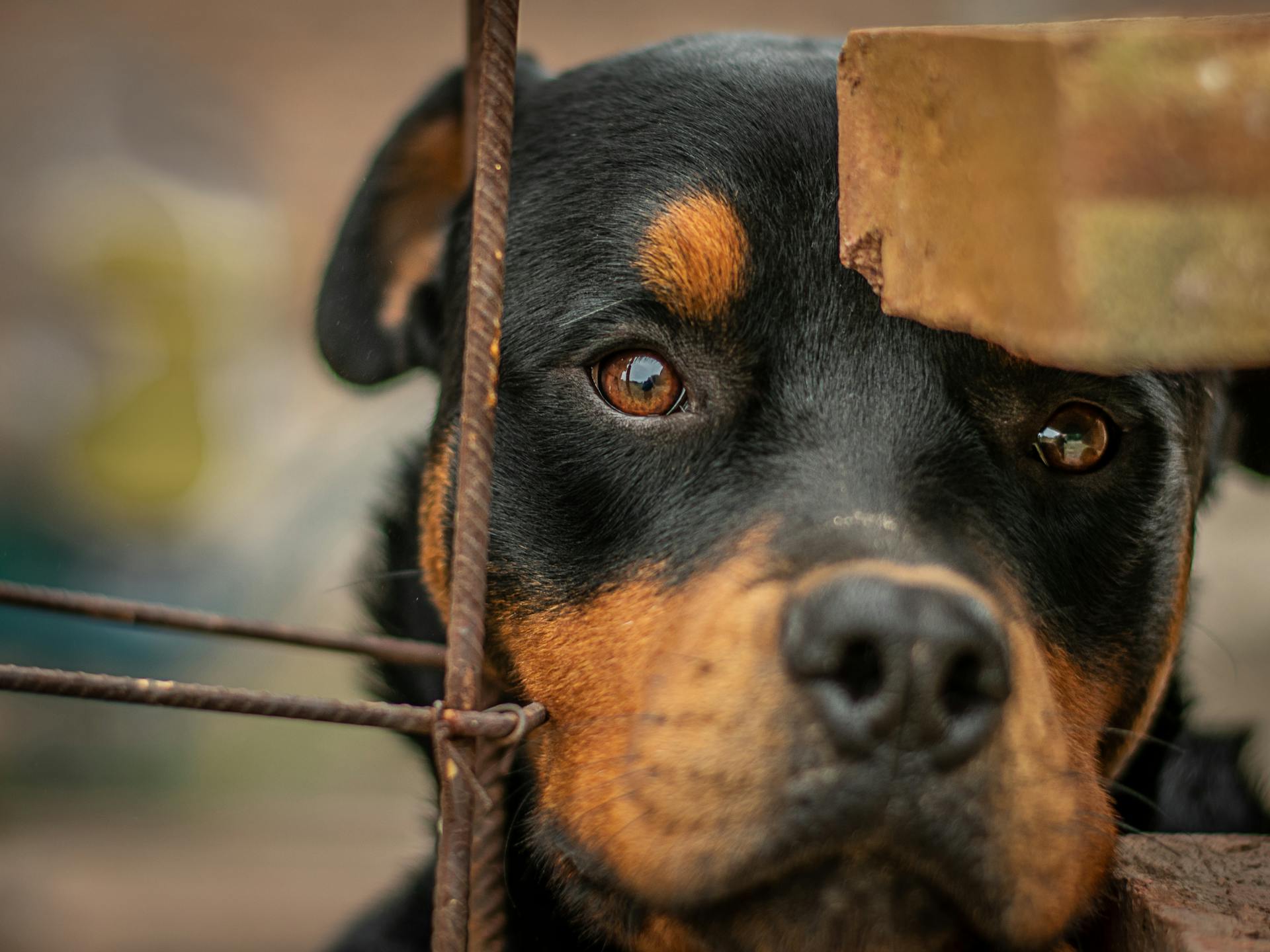
Bully breeds are banned in many areas across the United States. Some of these areas include Miami-Dade County in Florida, where pit bulls have been banned since 1989.
In the United States, over 800 cities and counties have laws restricting or banning pit bulls. Many of these laws are the result of high-profile incidents involving the breed.
Some cities that have banned bully breeds include Denver, Colorado; Milwaukee, Wisconsin; and St. Louis, Missouri. These cities have enacted breed-specific legislation (BSL) to regulate or prohibit the ownership of pit bulls.
Banning bully breeds is a contentious issue, with some arguing that it's a matter of public safety and others claiming it's an unfair targeting of a specific breed.
Breed Bans and Laws
Breed bans and laws can be confusing, but it's essential to understand the specifics. In some places, certain breeds are outright banned.
In the UK, Breed Specific Legislation (BSL) bans the ownership of four different types of dogs, including Pit bull terriers and Japanese Tosa. Additionally, the XL Bully will become illegal to own from February 1st, 2024, without a certificate of exemption.
Some cities in Colorado have extensive breed bans. For example, Lone Tree bans a wide range of breeds, including Cane Corsos, American Bulldogs, and Dogo Argentinos. Aurora, Castle Rock, and other cities have similar breed bans in place.
Dogs that are already owned but banned may be exempt from euthanasia if they don't pose a risk to public safety and their owner is considered fit and proper. However, owners must meet strict conditions, which can negatively impact the dog's welfare.
If you're unsure whether your dog is an XL bully-type, check the government's specifications or contact your local Dog Legislation Officer (DLO) for advice. They can help you determine if your dog falls under this category.
Here are some breeds that are banned in specific cities in Colorado:
- Lone Tree: Cane Corsos, American Bulldogs, Tosa Inus, Presa Mallorquins, Staffordshire Bull Terriers, American Staffordshire Terriers, Dogo Argentinos, Fila Brasilairos, and Canary Dogs
- Aurora, Castle Rock, Commerce City, Fort Lupton, Louisville, and Simla: Staffordshire Bull Terriers
- Denver, Castle Rock, Commerce City, and Fort Lupton: Dogo Argentinos
- Denver, Aurora, Castle Rock, Commerce City, Fort Lupton, Louisville, and Simla: American Staffordshire Terriers
Effective Alternatives Exist
Other countries have already proven effective alternatives to Breed Specific Legislation (BSL).
Many countries worldwide have reviewed BSL and the trend is to repeal it.
The Netherlands, Italy, and Lower Saxony, Germany have all repealed BSL.
In the US, many administrations have also chosen to repeal BSL.
New measures can improve the welfare of affected dogs, such as speeding up the review of cases to allow rehoming of prohibited types of dog by rescues.
Improving the welfare of seized dogs is also crucial, and can be achieved through the application of a guide on the issue.
Pet Ownership and Regulations
Pet ownership and regulations can be complex, especially when it comes to certain breeds. If you currently have an XL bully type dog, you'll need to keep them on a lead and muzzled when walking them in public from December 31st, 2023.
Additionally, owning an XL bully type dog will require additional restrictions, including having them neutered and getting third-party insurance. If you want to own an XL bully type dog, you'll need to comply with these requirements to get your dog exempted.
Here are some key requirements for XL bully owners:
- Microchip your XL Bully.
- Ensure your XL Bully has been neutered. However, if your dog is less than one year old on 31 January 2024, they must be neutered by 31 December 2024.
- Keep your XL Bully in a secure place so that they cannot escape.
- If questioned by a Police Officer or Council Dog Warden, XL Bully breed owners must show their Certificate of Exemption at the time of the request or within five days.
- If your XL Bully passes away or you move home, you must inform the Index of Exempt Dogs.
What If I Own?
If you own an XL Bully type dog, you're probably wondering how the government ban will affect you. The good news is that the government has announced an exemption scheme that will allow owners to keep their dogs if certain criteria are met.
To qualify for the exemption, you must pay £92.40 for a certificate, ensure your dog is microchipped, neutered, and covered by third-party public liability insurance. You'll also need to keep your dog on a lead and muzzled whenever they are in public, including in cars.
Additionally, you must keep your bully in a secure place at all times, so they can't escape. You must also be at least 16 years old to own an XL bully type. If you meet these requirements, you'll be exempt from the ban and can continue to own your XL Bully.
Here are the specific requirements for the exemption:
- Pay £92.40 for a certificate
- Ensure your dog is microchipped, neutered, and covered by third-party public liability insurance
- Keep your dog on a lead and muzzled whenever they are in public, including in cars
- Keep your bully in a secure place at all times, so they can't escape
- Be at least 16 years old to own an XL bully type
If you're unsure about the requirements or have any questions, it's best to check with the government or a local authority for more information.
Assessing Your Dog
If you're unsure about your dog's breed or size, it's essential to check government specifications to see if they fall under a specific category.
If your dog is an XL bully-type, you should contact your local Dog Legislation Officer (DLO) for advice on whether they meet the breed standards.
Don't worry if you're not sure what breed your dog is - it's always better to err on the side of caution and seek advice from a professional.
To get started, check the government's specifications on XL bully-type dogs to see if your dog matches the description.
Breeding and Ownership
Breeding XL bullies will be illegal after 31 December 2023, and breeders have been instructed to cease mating XL Bully dogs. This means that any puppies born after this date must be kept or put to sleep by a vet.
If an XL Bully dog is not included on the Index of Exempted Dogs, it will be an illegal offence to own the breed as of February 1, 2024. This includes rehoming centres, which will not be able to rehome XL bullies after 31 December 2023, even if they are well-behaved and well-socialised.
Breeding the XL Bully breed will be a criminal offence, and rehoming centres will not be able to rehome these dogs after 31 December 2023. This will result in many XL bullies being destroyed, so it's essential to take responsible measures to prevent this.
It's worth noting that the Dangerous Dogs Act makes it illegal to own a banned type unless they are exempt, and also makes it illegal to breed from, rehome, or sell these dogs.
Frequently Asked Questions
Is American Bully banned in Turkey?
The American Bully breed is restricted in Turkey due to its potential for aggression. Check the full list of countries where the breed is banned or restricted for more information.
Sources
- https://www.rspca.org.uk/whatwedo/endcruelty/changingthelaw/bsl
- https://www.linkedin.com/pulse/xl-bully-dog-ban-explained-buddypetsuk-3vjqe
- https://www.sloatlaw.com/blog/pitbulls-and-other-breeds-unwelcome-in-colorado-communities/
- https://theanimallawfirm.com/post/pit-bulls-and-breed-bans-is-my-dog-illegal-what-can-i-do/
- https://www.bullybillows.com/blogs/news/xl-bully-ban-new-laws-owners-next-steps
Featured Images: pexels.com


